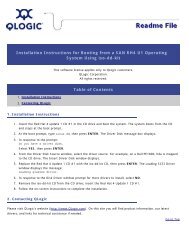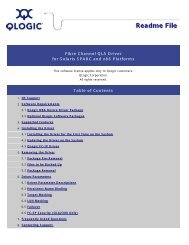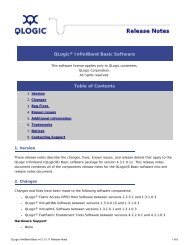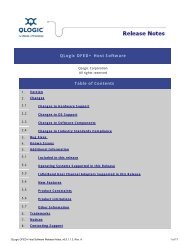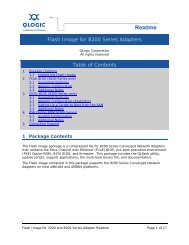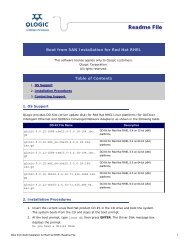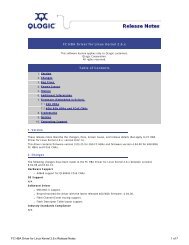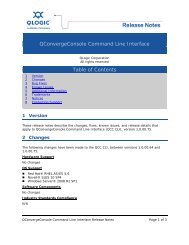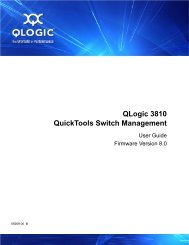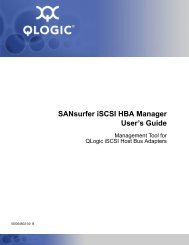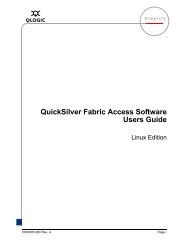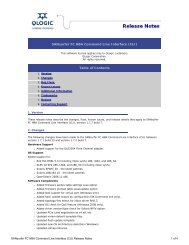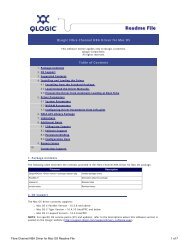QLogic OFED+ Host Software User Guide, Rev. B
QLogic OFED+ Host Software User Guide, Rev. B
QLogic OFED+ Host Software User Guide, Rev. B
Create successful ePaper yourself
Turn your PDF publications into a flip-book with our unique Google optimized e-Paper software.
E–Integration with a Batch Queuing System<br />
Using SLURM for Batch Queuing<br />
Allocating Resources<br />
When the mpirun command starts, it requires specification of the number of node<br />
programs it must spawn (via the -np option) and specification of an mpihosts<br />
file listing the nodes that the node programs run on. (See “Environment for Node<br />
Programs” on page 4-19 for more information.) Since performance is usually<br />
important, a user might require that his node program be the only application<br />
running on each node CPU. In a typical batch environment, the MPI user would<br />
still specify the number of node programs, but would depend on the batch system<br />
to allocate specific nodes when the required number of CPUs become available.<br />
Thus, batch_mpirun would take at least an argument specifying the number of<br />
node programs and an argument specifying the MPI program to be executed. For<br />
example:<br />
$ batch_mpirun -np n my_mpi_program<br />
After parsing the command line arguments, the next step of batch_mpirun is to<br />
request an allocation of n processors from the batch system. In SLURM, this uses<br />
the command:<br />
eval ‘srun --allocate --ntasks=$np --no-shell‘<br />
Make sure to use back quotes rather than normal single quotes. $np is the shell<br />
variable that your script has set from the parsing of its command line options. The<br />
--no-shell option to srun prevents SLURM from starting a subshell. The srun<br />
command is run with eval to set the SLURM_JOBID shell variable from the output<br />
of the srun command.<br />
With these specified arguments, the SLURM function srun blocks until there are<br />
$np processors available to commit to the caller. When the requested resources<br />
are available, this command opens a new shell and allocates the number of<br />
processors to the requestor.<br />
Generating the mpihosts File<br />
Once the batch system has allocated the required resources, your script must<br />
generate an mpihosts file that contains a list of nodes that are used. To do this,<br />
the script must determine which nodes the batch system has allocated, and how<br />
many processes can be started on each node. This is the part of the script<br />
batch_mpirun that performs these tasks, for example:<br />
mpihosts_file=‘mktemp -p /tmp mpihosts_file.XXXXXX‘<br />
srun --jobid=${SLURM_JOBID} hostname -s | sort | uniq -c \<br />
| awk ’{printf "%s:%s\n", $2, $1}’ > $mpihosts_file<br />
The first command creates a temporary hosts file with a random name, and<br />
assigns the name to the variable mpihosts_file it has generated.<br />
The next instance of the SLURM srun command runs hostname -s once for<br />
each process slot that SLURM has allocated. If SLURM has allocated two slots on<br />
one node, hostname -s is output twice for that node.<br />
D000046-005 B E-3



